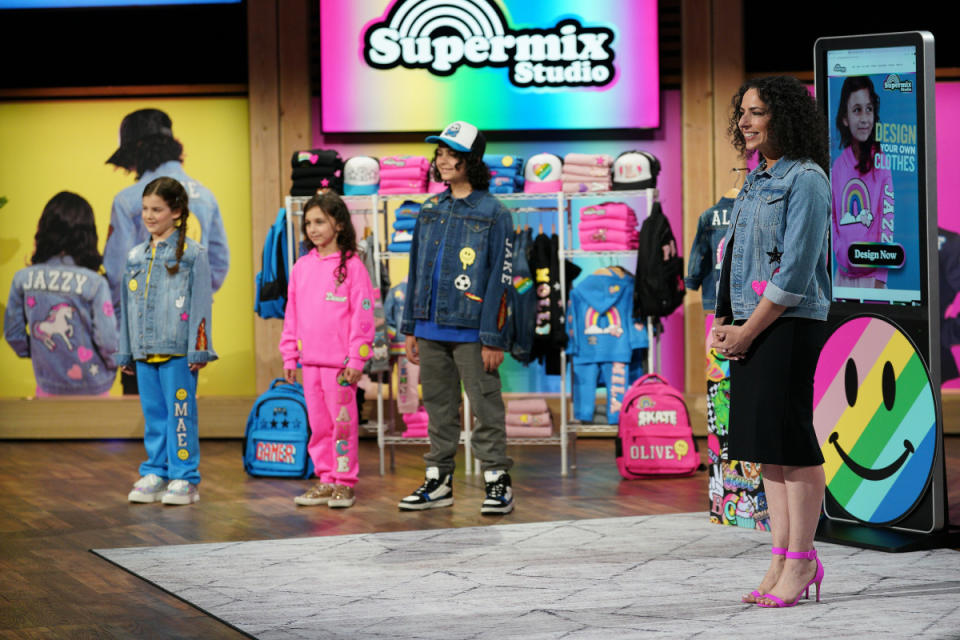Kids’ Custom Denim Brand Says Sales Up 2,000% Since ‘Shark Tank’ Splash
- Oops!Something went wrong.Please try again later.
- Oops!Something went wrong.Please try again later.

Jennifer Stein-Bischoff is patching up a hole that she saw in the children’s apparel market: a lack of customization.
Her company, Supermix Studio, gives consumers a way to customize kids’ backpacks, hats, hoodies, sweats and denim jackets online using simple drag-and-drop tools. Users can select from a number of patches to add to their garments, including letters, smiley faces, sports icons and more.
More from Sourcing Journal
Once the item is ordered, the hand-customized garment gets sent directly to the customer’s doorstep. The mother-of-two describes the clothing and accessory brand as “video game meets kids’ clothing.”
Recently, Supermix Studio gained some national exposure on a popular TV show.
Stein-Bischoff appeared on “Shark Tank” earlier this month to tout her business, and ultimately walked away with $250,000 in funding from investors Lori Greiner and Robert Herjavec. In exchange, she gave up 20 percent equity in Supermix Studio, with 3.5 percent royalties on the products until she pays back their initial investment.
That airtime launched her sales to the next level, she said.
“’Shark Tank’ was amazing because it really gave me an opportunity to present the brand and really talk about the brand and explain what it is and what it does. And we’re definitely seeing the customers respond to that,” she said. “On a good day [before ‘Shark Tank’], we would have about 300 website visits. And on [Nov. 3], the night ‘Shark Tank’ aired, we had 19,000.”
Stein-Bischoff, who previously worked in design and merchandising at industry nameplates including Tommy Hilfiger, Sean John, American Rag, Kohl’s, Aeropostale and Macy’s, said sales have surged about 2,000 percent since the episode aired, and denim accounts for about half of her total business.
The decision to include denim as a major part of her assortment felt easy, Stein-Bischoff said.
“Denim is my first love,” she said. “Denim jackets are so classic. It’s a blank canvas, so whatever you put on it looks really, really great.”
The cotton used in Supermix Studio’s manufacturing processes is BCI certified, Stein-Bischoff said. Fully recycled polyester is the basis for the brand’s backpacks.
Prior to “Shark Tank”, Supermix Studio mostly spread the word through social media marketing. It runs an influencer affiliate program that Stein-Bischoff said has proved fairly effective.
“What we’ve been doing is we’ve been gifting product, and the influencers then document their entire experience—from to designing to then unboxing and wearing of their creation. The authentic reactions that we’re getting from that process have really been what has helped get us off the ground,” Stein-Bischoff said.
But the cash infusion from Shark Tank will help the company scale, she added. She said that though Supermix was a “baby business” at the time the show aired, it already had the potential to move on to bigger things baked in—all its patches are proprietary, and Stein-Bischoff developed the customization software herself.

Stein-Bischoff said much of the capital will go toward expanding headcount.
But the rest will likely be invested in Supermix Studio’s kiosk model, which could expand its direct-to-consumer business model.
The kiosks would be placed in retail stores—whether freestanding or inside a shopping mall—and would allow consumers to design and order their garments in a brick-and-mortar environment. From there, Supermix would fulfill the orders made through the kiosk; that way, retailers don’t have to be on the hook to hold any unsold inventory on Supermix’s behalf.
Stein-Bischoff said she’s not concerned that a lack of instant gratification could curb in-store sales.
“I hear over and over again that kids don’t want to take their Supermix off, and ‘My kid is sleeping in their hoodie.’ … You have so much pride in what you created, so I think the effect of getting the product and that immense pride very easily offsets that instant gratification,” she said.
Supermix Studio doesn’t have a wide array of competitors, despite the fact that the children’s clothing market is heavily saturated. Little Chicken Kids, a children’s clothing store based in New Jersey, also sells custom denim jackets, but they go for nearly twice what Supermix’s jackets sell for.
Currently, Supermix Studio’s garment manufacturers are all based in China, but employees affix the patches to each item in the Port Jervis, N.Y. studio which houses company headquarters. At the moment, most orders leave the studio within five days of the consumer placing an order, according to the founder.
In the future, Stein-Bischoff plans to expand the line to juniors and adults. Supermix Studio already offers women’s and juniors’ hoodies, which can be customized as a solo item or as part of a “Mom and Me” set.
That expansion, she said, should be pretty straightforward because she can leverage her already built technology into a number of different arenas, so adding more adult items would only require new sizing and a new patch assortment.
“That’s certainly part of where the financing will go as well. … The obvious extension first is into juniors and collegiate… so we’re definitely looking at doing that. We’re already seeding some product at a couple of universities and playing with it that way,” Stein-Bischoff said. “I hear about it every day—why don’t you have women’s denim jackets? Why don’t you have men’s? So it’s absolutely coming.”

